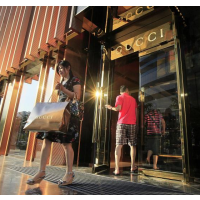Retailers Adjust to Rich Getting Richer and Middle Class Fading
 (AP photo)
(AP photo)
As Americans in the economic middle struggle to keep up, many retailers and other businesses have decided to focus on the demands of the wealthy.
Since the end of the Great Recession, the nation’s top earners have been doing a significant portion of the consumer spending during the weak economic recovery, which is great news for high-end businesses that cater to this class.
But retailers and restaurants that have long catered to the middle class are fading because middle-earners have so little disposal income these days.
The rich (considered the top 5%) don’t have the same problem. They were responsible for nearly 40% of domestic consumption in 2012. Two decades earlier, the rate was only 28% in 1995, according to research performed by economists Steven Fazzari, of Washington University in St. Louis, and Barry Cynamon, a visiting scholar at the Federal Reserve Bank of St. Louis.
They say inflation-adjusted spending by the top 5% has increased 17% since 2009, compared with just 1% among the bottom 95%.
The beneficiaries of increased spending by the wealthy have been luxury gambling properties like the Wynn and the Venetian in Las Vegas, five-star hotels like the Four Seasons and St. Regis, upscale clothing retailer Barneys New York, and others.
Meanwhile, many other companies are floundering, filing for bankruptcy, or closing their doors because they cater to the middle class. These businesses include Olive Garden and Red Lobster restaurants, and retailers Sears, J.C. Penney, and Loehmann’s.
“As a retailer or restaurant chain, if you’re not at the really high level or the low level, that’s a tough place to be,” John G. Maxwell, head of the global retail and consumer practice at PricewaterhouseCoopers, told The New York Times. “You don’t want to be stuck in the middle.”
Fazzari warns that relying too much on the rich to keep the economy going is not a sound long-term strategy.
“It’s going to be hard to maintain strong economic growth with such a large proportion of the population falling behind,” he told the Times. “We might be able to muddle along—but can we really recover?”
-Noel Brinkerhoff
To Learn More:
The Middle Class Is Steadily Eroding. Just Ask the Business World. (by Nelson Schwartz, New York Times)
Inequality, the Great Recession, and Slow Recovery (by Barry Z. Cynamon and Steven M. Fazzari, Washington University) (pdf)
U.S. Income Inequality Reaches Record Extreme (by Noel Brinkerhoff, AllGov)
Richest 7% Get Richer; Poorest 93% Get Poorer (by Noel Brinkerhoff, AllGov)
- Top Stories
- Unusual News
- Where is the Money Going?
- Controversies
- U.S. and the World
- Appointments and Resignations
- Latest News
- Trump to Stop Deportations If…
- Trump Denounces World Series
- What If China Invaded the United States?
- Donald Trump Has a Mental Health Problem and It Has a Name
- Trump Goes on Renaming Frenzy






Comments